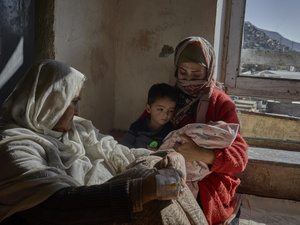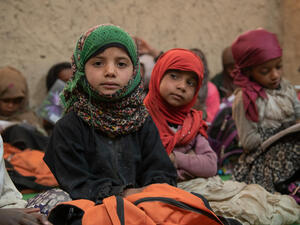Displaced families in Ukraine rely on the kindness of strangers
Displaced families in Ukraine rely on the kindness of strangers

Vladimir, 41, a carpenter from Donetsk, eastern Ukraine, cuddles his six-year-old son Ilya in the collective centre they now call home. It houses 151 people displaced by fighting in eastern Ukraine. For now the family is living in one room in this collective centre, the former offices of a shipyard.
MARIUPOL, Ukraine, January 5 (UNHCR) - Vladimir, 41, casts an eye around the tiny room his family now calls home. Everything he sees - clothes, three beds, dishes, pots and pans, and a television set that entertains his young son - is a donation from fellow Ukrainians.
Displaced by Ukraine's 10-month-old war, his family of four now lives in the cramped former offices of a shipyard in the south-eastern city of Mariupol along with 147 other people. "It's better than being shelled," he says cheerfully.
Mariupol has about twice as many people living in collective centres as other cities in Ukraine - 12 per cent compared to a national average of six percent. But either of these figures is low for an emergency, says Oldrich Andrysek, UNHCR's regional representative.
"This is an amazing achievement," he says. "Most displaced people are staying with families. It's an astonishing result in a country where the number of displaced people doubled every two months and has reached 610,000 in a short time - it's impressive not to have a whole series of collective centres."
Most of those staying in collective centres in Ukraine are elderly people, those living with disability, children evacuated from orphanages and people with no relatives they can stay with, or no money to pay rent.
"This puts a burden on the international community and the government to help with heating and unsanitary conditions" in the collective centres, Andrysek adds. Many were summer camps never intended to be occupied in the winter.
This particular collective centre may be an improvement for those escaping conflict, but the conditions are far from ideal. Rooms for the 151 residents are cramped and interconnecting - many have to pass through each other's bedrooms to get to the corridor to communal toilets, showers and kitchens.
When artillery shells began falling on their home in the eastern city of Donetsk last August, Vladimir's wife Olya, 29, recalls that "we fled in our summer clothes and only slippers." As anti-government forces battled the army, she recalls tanks on the streets and shells falling everywhere. "It was impossible to live there. We felt so much fear."
Vladimir takes a break from a lunch of pelmeni (dumplings) to explain how grateful the family is for the generosity of local citizens who have given them clothing, three beds and colourful red carpets affixed to the walls.
What rankles him, though, is a government welfare classification system that stipulates only certain groups of displaced people can receive cash grants. As UNHCR's Andrysek admits, the criteria assume that someone like Vladimir can support his family when that is not actually the case.
Those eligible for cash grants include invalids, families with many children, pensioners and single mothers. Thousands of people have returned to their homes in the east because they cannot afford to pay high rents.
Olya does not qualify, although she and Vladimir say their family is clearly in need. "Should I divorce her so she can get help?" Vladimir asks with irritation.
A moment later he's calmed down and talks more optimistically about returning home and buying glass to repair the windows in his badly damaged home - possibly by spring. He has the skills to do so - he's a carpenter, but unable to find work here in Mariupol. That's another sore point: He says local employers don't want to hire people from Donetsk.
Many of Ukraine's displaced fled Crimea last February or eastern Ukraine last summer thinking they would be away from home only a few days. "It's a very strange situation - maybe half the people in eastern Ukraine, even if they have an apartment to go home to, have realized they . . . won't be accepted in eastern Ukraine," Andrysek says. Their displacement threatens to become prolonged, and UNHCR is seeking US$40 million to assist them over the coming year.
At the collective centre, Olya is happy that at least her eight-year-old daughter, Nastya, is able to go to school. Meanwhile, Ilya, aged six, plays with plastic building blocks at a small table next to the muted TV. What hopes do these parents have for their children's future? "Peace," replies Vladimir without hesitation. "I don't want anything material," chimes in Olya, "only peace."
By Kitty McKinsey in Mariupol, Ukraine









